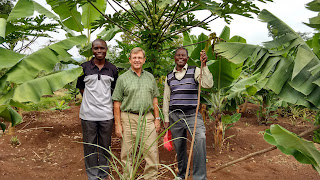After all, what is Apollos? What is
Paul? We are simply God's agents in bringing you to faith. Each of us performed
the task which the Lord allotted to us. We planted the seed, and (John and
Ibrahim) watered it; but God made it grow. Thus it is not the gardeners with
their planting and watering who count, but God who makes it grow. Whether they
plant or water, they work as a team, though each will get his own pay for his
own labor. We are God's fellow-workers, and you are God's garden. (1 Corinthians 3:5-9)
 |
| Seminar in Shinyanga, Tanzania |
As we left
Tanzania and Kenya four months ago, we emphasized to the church leaders that we
had only planted the seed and given them tools for leadership training, now it
was their work to carry on. In many ways it was a challenge to our faith to
leave what we had spent four years in planning and producing, in the hands of
local leaders. But over and over we told ourselves, this is not our work, but
the work of God to carry on through local leaders. We prayed for just a few
leaders to catch a vision and burden for further leadership training in our
Mennonite churches. We as partners from the West want to continue to support
deep spiritual growth in the leaders but also want to see it springing out of
local
initiatives from within the churches.
 |
| Participants at the seminar in Shinyanga, Tanzania |
 |
| Missionary Peter Sensenig with his translator |
Recently we
received Facebook messages that affirm our faith in God's working with the
seeds we have planted. Bishop Joseph Nyakyema and Shinyanga Diocese held a seminar for church
leaders of Shinyanga and Tabora KMT Dioceses. Pastor John Wambura taught "Leadership Strategies and Tools," Pastor George Nyaundi taught "Mission and Church Planting," and missionary Dr. Peter Sensenig taught "Conflict Resolution among Leaders" and "Christian-Muslim Relations."
Pastor John Wambura wrote to us, “You planted the SEED, I am just watering it! They said ‘We need more practical training for change.’ Your impact is proved by the attendance from Sumbawanga of six participants!!” Sumbawanga is a remote area in southwestern Tanzania where we had spent four months to provide more intensive training!
Pastor John Wambura wrote to us, “You planted the SEED, I am just watering it! They said ‘We need more practical training for change.’ Your impact is proved by the attendance from Sumbawanga of six participants!!” Sumbawanga is a remote area in southwestern Tanzania where we had spent four months to provide more intensive training!
John emailed
us further explaining that he met with the Sumbawanga participants to evaluate
their progress and their needs in both spiritual and economic development. Their proposal for working at these areas include building five
new churches, training leaders for these churches and helping them to establish
financial stability. We praise God for the work he is doing among these leaders
and watering the seeds we planted. We pray that it will "yield fruit in its
season." Continue to remember the "team" working in the garden!!



















